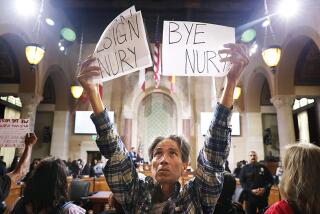Low-Profile Rove Pushed Into Political Spotlight
- Share via
WASHINGTON — With publication of a sharply critical attack on the influence of President Bush’s chief political advisor, Karl Rove found himself on Monday once again in the public eye he so carefully tries to avoid.
John J. DiIulio Jr., a Democrat and university professor whom Bush brought to Washington to run the Office of Faith-Based Initiatives -- and who left seven months later -- was quoted in a magazine interview as saying the administration’s policy was run by the political operatives.
“It’s the reign of the Mayberry Machiavellis,” DiIulio said in an interview in the January issue of Esquire magazine.
His comments raced through the capital, and the firestorm they created was barely dampened when White House Press Secretary Ari Fleischer called them “baseless and groundless.”
Indeed, those were the very words DiIulio chose to use by the end of the day when, in his second statement backing away from his remarks, he said his commentary on the White House was “groundless and baseless due to poorly chosen words and examples.”
The commentary by the man Bush summoned to shepherd into existence one of the most important elements of “compassionate conservatism” touched a nerve, because Rove is considered central to Bush’s domestic policy and politics.
That Rove would likely end up in such a position was forecast this year by no less than the White House chief of staff, Andrew H. Card Jr.
In lengthy remarks that also appeared in Esquire in its July issue, Card worried that the departure from the White House last summer of Karen Hughes, another senior Bush advisor, would leave the ideological Rove with the upper hand among all Bush assistants.
“The key balance around here has been between Karen and Karl Rove,” Card was quoted as saying.
A GOP lobbyist with ties to the White House said Rove’s power stemmed from Bush’s readiness to listen to his advice and Card’s disinclination to tangle with him. The lobbyist used the words “benign neglect” to characterize Card’s approach to Rove.
One veteran of the first Bush White House, who admires Rove’s political and policy acumen but has found himself at odds with him, said that to some extent Rove can do little to avoid the sort of problem he encountered Monday.
“He’s in a dangerous place in Washington. His profile is getting high, not through self-promotion but because of his success and his being an increasingly attractive target for a lot of people,” the Republican said. He added pointedly: “Bagging Karl Rove -- that would be the biggest trophy in town.”
Neither the lobbyist nor the former aide in the administration of the president’s father would speak on the record, seeking to avoid drawing Rove’s fire.
To a large extent, Rove, who will turn 52 on Christmas Day, tries to keep a low profile, granting few interviews to reporters.
Nevertheless, his effort to remain out of the public eye is countered by factors that unavoidably draw attention to him: his closeness to Bush, his success in engineering Bush’s triumph in 2000 and his most recent achievement, choreographing Bush’s hands-on role in the 2002 congressional elections, which returned both houses of Congress to GOP control.
The Democratic magazine Blueprint assessed the White House work in the congressional campaign, described the process as “Rovery” and came up with this definition for the new word in the political lexicon: “The art of acting in a thoroughly partisan manner while appearing to be above the political fray.”
Meanwhile, Texas Monthly magazine is preparing a profile of Rove’s work for Bush in Texas, and at least two biographies are in the works.
Rove is known for his attention to detail, in politics and policy. The staff member in the previous Bush White House said admiringly that Rove would know “the number of yard signs you need in Amarillo,” Texas, as well as the details of pending legislative issues -- the ins and outs of tort reform, for example.
DiIulio returned to the faculty of the University of Pennsylvania in August 2001 after creating the office. It was intended to make it easier for religious organizations and private charities to perform some of the social welfare functions of government. Congress has yet to pass legislation at the center of the proposal.
In the Esquire interview, he said, “There is no precedent in any modern White House for what is going on in this one: complete lack of a policy apparatus.”
“What you’ve got is everything, and I mean everything, being run by the political arm,” he said, adding that Rove is “enormously powerful, maybe the single most powerful person in the modern, post-Hoover era ever to occupy a political advisor post near the Oval Office.”
DiIulio’s office said Monday that he would not be available to comment on his remarks.
But he issued two written statements.
First, he said, the magazine story was “unjustly hard on Mr. Rove and over-the-top complimentary to me, thereby creating a too-pat contrast that is, I feel, most unfair to Mr. Rove.” (His written statement emphasized in boldface the final five words of the sentence).
Then, after the White House press secretary spoke up, DiIulio issued a second statement, incorporating the words “groundless and baseless.”
“I sincerely apologize and I am deeply remorseful,” he wrote.
More to Read
Get the L.A. Times Politics newsletter
Deeply reported insights into legislation, politics and policy from Sacramento, Washington and beyond. In your inbox three times per week.
You may occasionally receive promotional content from the Los Angeles Times.










